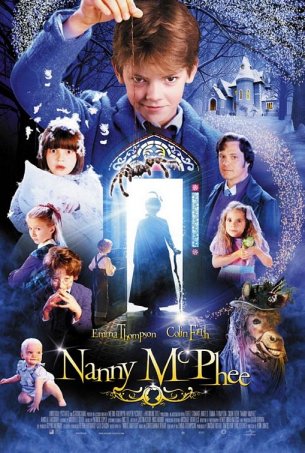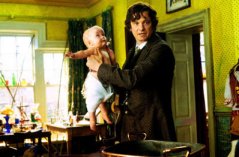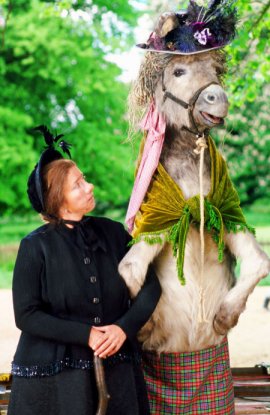|
Nanny
McPhee Every
film has an audience. Sometimes a film aimed at one group
manages to find some appeal with another, and this is called
a “crossover” film. One example of this would
be the Harry Potter franchise, a set of films based
on a mythology aimed at a younger audience, yet somehow
managing to rope adults into the fold as well.
Nanny
McPhee is not a crossover film, but don’t hold
that against it. This film is bound to entertain its intended
party, which is primarily children, and the good news is
that parents won’t find the film to be a chore to
sit through in the process.
Why isn’t
it a chore? Well for starters, Emma Thompson not only stars
as the nanny in question but also pulls double duty as screenwriter
as well. Her wit and charm not only makes the character
Nanny McPhee likeable, but also provides the tale with a
sense of purpose for both children and adults in the viewing
audience alike.
The plot is simple
enough on the surface, Cedric Brown (Colin Firth) is a widower
with seven ne’er-do-well children who have perfected
the art of driving nannies away from the home screaming.
Simon Brown (Thomas Sangster) leads the children in their
revolt on adults and even goes so far as to track their
progress on a flow chart kept in the closet.
Everything seems
to take on an interesting turn when we are introduced to
the Brown’s scullery maid, Evangeline (Kelly McDonald).
The children are a handful, and Cedric’s life is nothing
short of a blur between work and hiring new nannies, yet
Evangeline seems to look at both parties with a sense of
understanding. She does not approve of the kids’ dastardly
tactics, as we witness when the conniving lot send their
twelfth nanny screaming from the home under the impression
that they had cooked and ate their infant sister.
This, of course,
was accomplished by dressing up a chicken in the infant’s
clothes.
Evangeline questions
the children’s actions, and she is surprised along
with the audience to learn two very important reasons for
their behavior. First and foremost, the Brown children are
still trying to overcome the tremendous pain involved with
losing their mother and feeling as though their father no
longer has time for them. The second is that they adamantly
fear that their father plans to remarry, bringing a stepmother
into their home. Let’s just say that the kids are
very well versed in fairy tales, which provide factual evidence
that stepmothers are pure evil.
This helps shed
light on their behavior, but it also provides the audience
with a point of view regarding Evangeline as well, who has
obviously developed feelings for Cedric and his children
but is heartbroken to hear how the children feel about potential
surrogate mothers.
It is under these
situations that we are first introduced to Nanny McPhee
(Emma Thompson). Having finally run through every nanny
in the agency, Cedric is magically approached by McPhee
who has strict rules of operation: “When you need
me, but do not want me, then I will stay. When you want
me, but do not need me, then I have to go.”
In typical
fashion, Nanny McPhee proves to be a magical outsider with
supernatural resources to fix anything in the blink of an
eye. In this case, Nanny’s magic is accompanied by
a tap of her cane on the floor, which is demonstrated right
off the bat with an altercation in the kitchen. The kids
refuse to do as they are told, so McPhee uses her magic
to force the children to continue to misbehave to the point
of wanting stop.
So with a precident
like this set most children’s films would settle into
the routine, exploiting McPhee’s magic for the sake
of “teaching the kids lesson after lesson.”
Nanny McPhee refrains from such laziness and instead allows
the children to make decisions on their own, under the promise
of living with the consequences of their outcomes.
When their decisions
prove to cause more trouble than intended, Nanny does not
sweep in to save the day, but instead encourages the children
to be creative and work through their troubles on their
own.
This is a refreshing
look at a tried and true formula, but in addition the film
seems to have a message to convey to the adults in the audience
as well because the children’s misbehaving is as much
a result of Cedric’s refusal to engage his kids as
it is their poor manners.
Not
everything is mired in moral volleying between children
and adults, Nanny McPhee still manages to dip into
the absurd and comical with regular intervals. Infants talk
and donkeys get mistaken for children and wind up dancing
in the courtyard. It’s a regular hoot and a holler
as food fights ensue, leading to a magical reprisal in the
final act.
Many
films target the youthful audiences without bringing something
worthwhile to the table, and although Nanny McPhee
fails to transcend the singular children’s comedy
genre, it does manage to accomplish what it sets out to
do without stooping too low in the process.
Rating:

|








